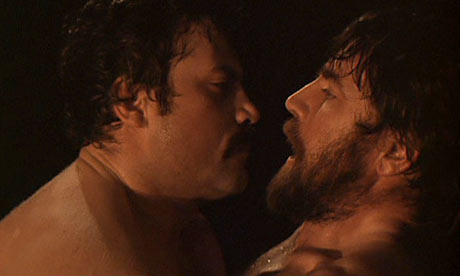
Marx, photo from Wikipedia
Ever wonder about all those socialists in Europe and South America? Democratic socialism is a philosophy that evolved from Marx, who wrote in the 19th Century about the gross indecency of capitalist excesses at the time, of dire conditions for workers and the lack of worker protections. Today, it has become a political and humanistic philosophy that supports the peaceful, non-revolutionary move to a more perfect world of equality, diversity, and liberty.
In my view, the Soviet Union was never socialist in any humanistic sense. The film "Reds" (http://en.wikipedia.org/wiki/Reds_%28film%29) shows how things went horribly wrong in Russia. So much idealism smashed to pieces by the warring factions and the string of dictatorships. It's good old English Socialism I like. Just keep the greedy capitalists on a leash. A short one. Here is the Ethical Charter of the Socialist International. It is a noble document.
http://www.socialistinternational.org/viewArticle.cfm?ArticleID=24
Basic documents of
the International
Member parties
around the world
About Us
ETHICAL CHARTER of the SOCIALIST INTERNATIONAL
Adopted at the XXII Congress of the Socialist International, São Paulo
We, member parties of the Socialist International, reaffirm our total commitment to the values of equality, freedom, justice, solidarity and peace which are the foundation of democratic socialism. We solemnly undertake to respect, defend and promote those values in the spirit of the fundamental declarations and campaigns of the Socialist International.
Our support to these values implies that we apply in the strictest way possible, the following code of conduct :
1. To carry through progressive politics that favour well-being of individuals, economic expansion, equitable trade, social justice, the protection of the environment in the spirit of sustainable development.To oppose all social and economic politics to the advantage of privileged groups, and promote the creation of a global economic system which will lead to more equitable and fair North-South relations.
To combat corruption in all its forms and the obstacles to good governance.
2. To defend pluralistic democracy. This implies :
• the freedom of citizens to choose between political options in the framework of free, frequent and transparent elections;
• the possibility of a change of government through peaceful means and the free expression of citizens;
• respect of the rights of minorities and individuals;
• an independent and impartial judicial system based on the law;
• a free and pluralistic press;
• democratic running of political parties.
3. To guarantee, under all circumstances, the respect of human dignity and to act in accordance with the Universal Declaration of Human Rights and the other important conventions adopted by the United Nations and its institutions.
To ban the death penalty.
To respect and reinforce the fundamental human rights, be they individual rights (respect of private life, freedom of thought, belief, education, sexual orientation and right to equal treatment etc.), social rights (freedom of trade unions, right to strike, social protection etc.) or political rights (freedom of association, universal vote).
To foster gender equality in every area of private and public life, including within our parties, in decision-making positions in all fields and at all levels.
To fight against all forms of discrimination based on gender, race, ethnical origin, sexual orientation, language, religion, philosophical or political beliefs.
To fight against all ultra nationalist, fundamentalist, xenophobic and racist trends and to refrain from all forms of political alliance or co-operation, at any level, with any political party inciting or trying to inflame prejudices, ethnic or racial hatred.
To reject and resolutely oppose any drift to authoritarianism as well as any political system which allows or practises the violation of human rights to conquer or impose its power (political assassination, torture, arbitrary detention, press censorship, banning or repression of peaceful demonstrations, etc).
4. To support international action in favour of peace, tolerance, dialogue, understanding and cooperation among peoples.
To abstain from using military force to gain power or to lead a foreign policy, beyond the framework authorised by the relevant international organisations,
To strive to eliminate weapons of mass destruction and to facilitate disarmement.
Strengthen the role of the United Nations and regional institutions which work towards achieving peaceful solutions to conflicts.
5. An ethics committee is in charge of monitoring the respect of the present code of conduct by all the member parties and it is empowered to formulate recommendations or even proposals of sanctions to the leading organs of the Socialist International.
SOCIALIST INTERNATIONAL, MARITIME HOUSE, OLD TOWN, CLAPHAM, LONDON SW4 0JW, UNITED KINGDOM
Socialist International












